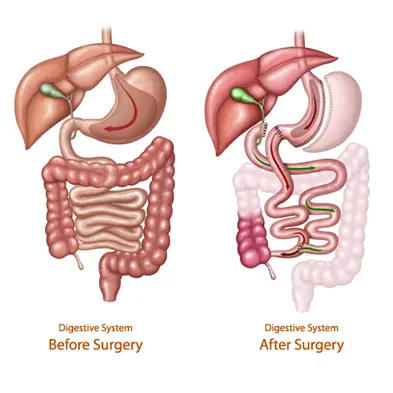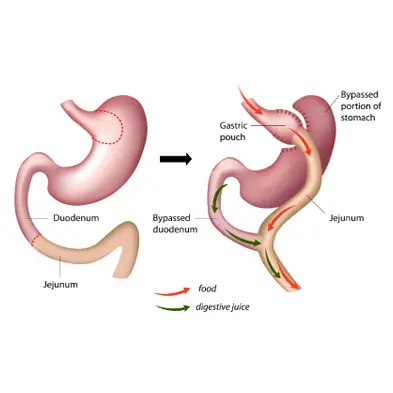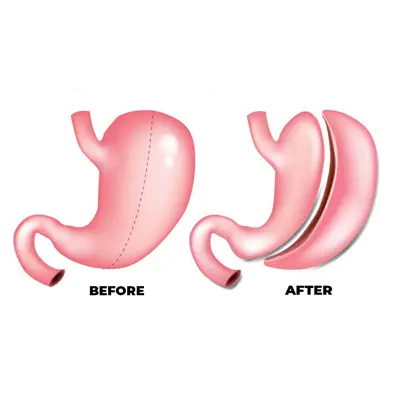Bariatric Surgery
Why needed?
Gastric bypass and other weight-loss surgeries, commonly referred to as bariatric or metabolic surgery, encompass surgical interventions targeting the digestive system to facilitate weight reduction.
Bariatric surgery is typically recommended when conventional approaches such as diet and exercise have proven ineffective or when weight-related health complications reach a severe level. Some weight-loss procedures restrict food intake, while others curtail the body's capacity to absorb fat and calories. Certain procedures combine both modalities.
While bariatric surgery can yield numerous advantages, it is imperative to acknowledge that all weight-loss surgeries are intricate procedures that entail inherent risks and potential side effects. Furthermore, embracing permanent healthy dietary modifications and adhering to a consistent exercise regimen are paramount for ensuring the enduring success of bariatric surgery.
3 Types of Bariatric Surgery

BPD/DS
A biliopancreatic diversion with duodenal switch (BPD/DS) is a less-common weight-loss procedure that involves two major steps. BPD/DS is typically performed as a single operation.
The first step is a sleeve gastrectomy, removing approximately 80% of the stomach to create a smaller, tube-shaped stomach resembling a banana. This preserves the pyloric valve and a portion of the duodenum.
In the second step, the small intestine is connected to the duodenum near the stomach, bypassing a significant portion of the intestine. This BPD/DS procedure restricts food intake and reduces the absorption of nutrients, including proteins and fats.

Gastric bypass
Gastric bypass, also known as Roux-en-Y surgery, creates a small stomach pouch connected directly to the small intestine for weight loss.
After gastric bypass, food bypasses most of the stomach and the first section of the small intestine, entering the small pouch and then directly into the small intestine.
Gastric bypass is a common bariatric surgery option when diet and exercise fail or when serious health problems arise due to weight.
Note that not all severely overweight individuals qualify for gastric bypass; specific medical criteria must be met for weight-loss surgery eligibility.

Sleeve gastrectomy
Sleeve gastrectomy, also known as vertical sleeve gastrectomy, is a surgical weight loss procedure. It involves removing approximately 80% of the stomach, leaving behind a smaller pouch that can hold only 150-250 ml of food. This reduction in stomach size decreases ghrelin production, the hunger hormone, leading to a feeling of fullness after consuming smaller meals. Sleeve gastrectomy promotes long-term weight goals by encouraging smaller portions and food breakdown. It is a permanent and irreversible procedure, requiring a lifelong commitment to a healthy lifestyle.
This Surgery helps to lose excess weight and reduce your risk of potentially
life-threatening weight-related health problems, including:
- Heart disease
- High blood pressure
- High cholesterol
- Obstructive sleep apnea
- Type 2 diabetes
- Stroke
- Cancer
- Infertility


Dr. Paritosh S Gupta
Head - General, Minimal Access & Bariatric Surgery Artemis Hospitals, Gurugram
Dr. Paritosh S Gupta is a distinguished General Surgeon, renowned for his expertise in performing surgical procedures. With an impressive career spanning over 25 years, he has successfully completed more than 14,000 surgeries, establishing himself as one of the most accomplished surgeons in India. His exceptional skills and contributions to the medical field have earned him the esteemed honor of being elected to the prestigious National Academy of Medical Sciences.
Start Now
We deliver end to end solution for Bariatric surgery at Artemis Hospitals. Contact us today along with your medical report and get back to normal life after treatment.




